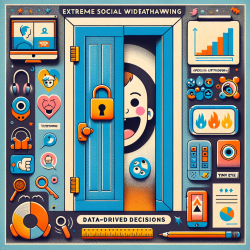Introduction
In the ever-evolving field of speech-language pathology and mental health, data-driven approaches are crucial in crafting effective interventions. One such promising intervention is the Emotion Regulation Individual Therapy for Adolescents (ERITA), specifically designed to address nonsuicidal self-injury disorder (NSSID) among adolescents. A recent open pilot trial and mediation analysis of an online version of ERITA has shown significant promise in improving outcomes for young individuals struggling with NSSID. This blog explores the findings of this study and how practitioners can leverage these insights to enhance their therapeutic practices.
Understanding the Study
The study, conducted with 25 adolescents aged 13-17 and their parents, evaluated the feasibility, acceptability, and utility of an online version of ERITA. The participants underwent self-report and clinician-rated assessments of outcomes such as NSSI, self-destructive behaviors, emotion dysregulation, and global functioning at various intervals. The results were compelling, demonstrating a statistically significant increase in past-month NSSI abstinence and large-sized improvements in NSSI frequency and global functioning from pre- to post-treatment.
Key Findings
- High Treatment Completion Rate: The study reported a 96% treatment completion rate, indicating high engagement and feasibility of the online format.
- Significant Reductions in NSSI: There was a 55% reduction in NSSI frequency, with improvements further strengthened at 3-month follow-up and maintained at 6-month follow-up.
- Improved Emotion Regulation: Medium-sized improvements in emotion dysregulation were observed, highlighting the therapy's effectiveness in addressing core emotional challenges.
- Positive Parent Involvement: The online therapist-guided parent program was associated with small- to large-sized improvements in adaptive parent behaviors.
Implications for Practitioners
These findings underscore the potential of online therapeutic interventions in reaching adolescents who might otherwise have limited access to face-to-face therapy. For practitioners, integrating online ERITA into their practice can offer several advantages:
- Increased Accessibility: Online therapy eliminates geographical barriers, making it easier for adolescents to access evidence-based treatments.
- Cost-Effectiveness: With reduced therapist time required, online interventions can be a cost-effective solution for both providers and families.
- Enhanced Engagement: The structured format and interactive elements of online therapy can increase engagement and adherence among adolescents.
Encouraging Further Research
While the results of this study are promising, the authors recommend replicating the findings in controlled studies to further validate the efficacy of online ERITA. Practitioners are encouraged to stay informed about ongoing research and consider participating in studies that explore innovative therapeutic approaches.
Conclusion
The online adaptation of ERITA represents a significant step forward in providing accessible, effective treatment for adolescents with NSSID. By embracing data-driven decisions and integrating these findings into practice, speech-language pathologists and mental health professionals can contribute to transforming the lives of young individuals.
To read the original research paper, please follow this link: Extending research on Emotion Regulation Individual Therapy for Adolescents (ERITA) with nonsuicidal self-injury disorder: open pilot trial and mediation analysis of a novel online version.










